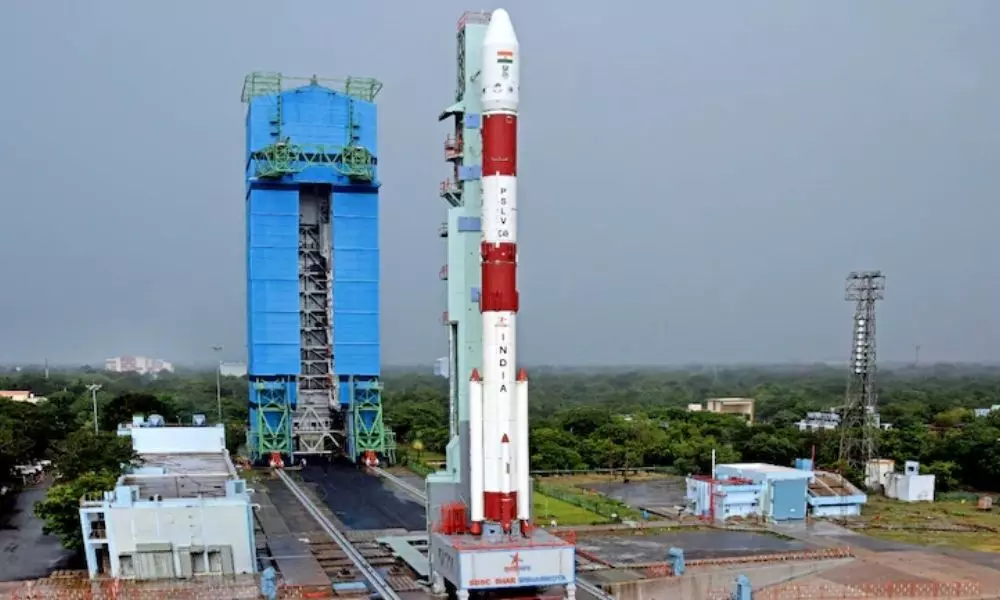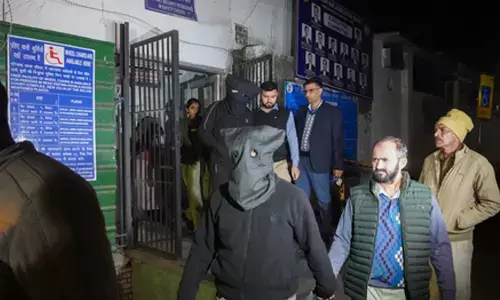Countdown for launch of Indian rocket in progress

Countdown for launch of Indian rocket in progress
The countdown for the Saturday evening launch of the Indian rocket, Polar Satellite Launch Vehicle-C49 (PSLV-C49), carrying the country's radar imaging satellite and nine other foreign satellites is progressing well with the fuelling of second and fourth stage completed, said Indian space agency.
Chennai: The countdown for the Saturday evening launch of the Indian rocket, Polar Satellite Launch Vehicle-C49 (PSLV-C49), carrying the country's radar imaging satellite and nine other foreign satellites is progressing well with the fuelling of second and fourth stage completed, said Indian space agency.
According to Indian Space Research Organisation (ISRO), fuelling of second and fourth stages/engines got over. The proposed launch will be the first space mission for ISRO from India in 2020.
The 26-hour countdown began at 1.02 p.m. on Friday. During countdown, apart from fuelling, other rocket systems will be checked.
The rocket with 10 satellites is scheduled to lift-off from the first launch pad at the Satish Dhawan Space Centre (SDSC) in Sriharikota in Andhra Pradesh at 3.02 p.m. on Saturday, ISRO said.
On January 17, 2020, India's telecommunication satellite 3,357 kg GSAT-30 -- a replacement for INSAT-4A -- was successfully launched into a Geosynchronous Transfer Orbit (GTO) from Kourou launch base in French Guyana by an Ariane rocket.
This time around, the ISRO is using the PSLV rocket's DL variant that will have two strap-on booster motors.
This rocket variant was used the first time to put the Microsat R satellite into orbit on January 24, 2019.
The PSLV is a four stage/engine rocket powered by solid and liquid fuels alternatively with six booster motors strapped on to the first stage to give higher thrust during the initial flight moments.
The primary passenger of the 44.5 metre tall PSLV-C49 will be the Indian radar imaging satellite EOS-01 (formerly RISAT-2BR2) with synthetic aperture radar (SAR) that can shoot pictures in all weather conditions.
The satellite can take pictures day and night and will be useful for surveillance as well as civilian activities.
According to ISRO EOS-01, an earth observation satellite, intended for applications in agriculture, forestry and disaster management support.
The nine foreign satellites that would piggyback are from: Lithuania (1-R2, technology demonstrator), Luxembourg (4 maritime application satellites by Kleos Space) and the US (4-Lemur multi mission remote sensing satellites).
If all goes well with the Saturday evening rocketing, then the Indian space agency would have slung a total of 328 foreign satellites, all for a fee.
After PSLV-C49, the next one to fly will be PSLV-C50 with the GSAT-12R satellite. It will fly from the second launch pad, S. Somanath, Director, Vikram Sarabhai Space Centre (VSSC), had told IANS earlier.
"We are targeting PSLV-C50 sometime in December. It needs about 30 days to get ready for another launch after one launch," Somanath had said.
The other Indian satellites that are ready for launch are GISAT, Microsat-2A and GSAT-12R.
The launch of the GISAT-1 satellite slated for March 5 this year was postponed due to technical reasons a day before the launch.
"The GISAT-1 satellite will be carried by a GSLV rocket. The GSLV rocket was dismantled after the launch was called off. The rocket is being refurbished. The rocket's cryogenic engine has been brought down and it is being readied again," Somanath had said.
According to him, the GSLV carrying GISAT-1 is expected to fly after PSLV-C50.









